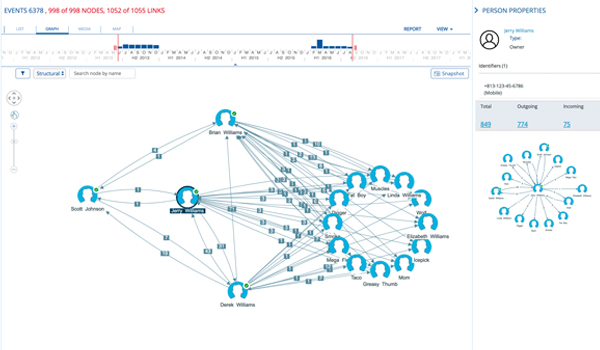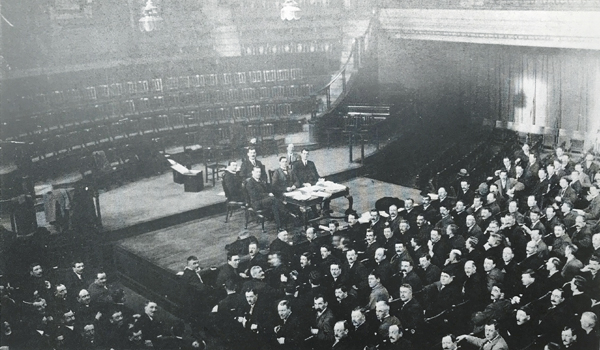Q & A with Lady Elish Angiolini
Don’t miss out on your chance to provide witness information to the Angiolini Inquiry.
The Angiolini Inquiry was established to investigate how off-duty police officer Wayne Couzens, was able to abduct, rape and murder a member of the public.
Following the publication of the first part of the report in February 2024, Part 2 is looking at whether there is a risk of recurrence of a similar incident across policing. It will also investigate police culture and address the broader concerns surrounding women’s safety in public spaces.
As part of this the inquiry is asking staff and police officers across England and Wales to help inform its findings by taking part in a survey which can be accessed via your force intranet or communications network. It closes on May 16.
1. Why have you decided to launch this survey when you have already had the opportunity to speak to many officers and staff from forces around the country. Are you concerned that more voices need to be heard, that some of what is going on within policing has not yet been brought to the surface.
The purpose of this survey is to get as many views and experiences from police officers and staff as possible to inform the Inquiry’s findings. It’s really important that we consider the views of those most affected by the issues identified in the Part 1 report, which we are exploring further for Part 2. The views of those who complete the survey, which covers a range of topics such as recruitment, vetting, culture, and standards (including misconduct processes), will provide the Inquiry with additional evidence and inform its findings.
We have already received evidence from many police officers and staff, but I wanted to do further evidence gathering to ensure everyone working in policing across England and Wales has the opportunity to have their voices heard.
This survey is just one part of the evidence gathering we are conducting. The results will be important evidence and considered alongside witness statements, academic findings, data and other forms of evidence.
2. One consequence of a strong culture is that people are often reluctant to come forward and speak out against their colleagues. This could be clearly seen in the case of Wayne Couzens. Has Part 1 of the inquiry given you any confidence that people are now more willing to come forward?
I am very grateful to the officers and staff who have come forward to give evidence to the Inquiry so far.
This confidential survey opens the opportunity for all staff and officers to have their voices heard and share their views with the Inquiry. I want to hear from police constables, staff members or anyone involved at any level in protecting the public on a day-to-day basis. I urge you all to take this chance to participate and share your experiences in this confidential format.
One of the recommendations from the Part 1 report was that all police forces with immediate effect should take action to understand and confront the barriers that police officers and staff face when reporting sexual offences committed by a person that they work with or in the workplace (Recommendation 15). We’re now over a year on from the publication of Part 1 and I continue to urge policing institutions and police forces to take action to ensure that those who need to report their colleagues for harassment, sexual offences and inappropriate behaviour can do so safely without fearing being re-victimised or treated as a ‘trouble-maker’ as a consequence. As I wrote in my letter to NPCC Chair Chief Constable Gavin Stephens in February, we must no longer allow those entrusted to protect the public to be intimidated, harassed or victimised by their colleagues, or failed by the organisations for whom they work so hard.
3. Although the survey is confidential, officers and staff may be concerned that the specific incidents they have witnessed could still lead to their identification. What reassurance can you offer them?
In this survey I’m asking questions on a range of topics, such as police recruitment, vetting, culture, and standards, including misconduct processes. All questions are entirely voluntary to complete, and we’ve included prefer not to say options provided throughout.
The information we gather will be analysed and any published findings will be anonymised to ensure that individual staff and officers cannot be identified. You can read more about the Inquiry’s privacy notice on our website.
4. Would it be better if police culture were more uniform across the country? If there has been a change in culture, have the recommendations from Part 1 contributed to this?
From our Part 1 findings, we know that policing is not a homogenous whole, and pockets of different cultures exist within police forces. Police culture is something that I am examining as part of the work for Part 2 of this Inquiry. I hope the survey will help inform this work as we gather views from forces from across England and Wales.
I was heartened to see all of the 16 recommendations I made were accepted within a month of publication. I am grateful to the NPCC for the ongoing updates on progress made against the recommendations. There remains much still to do.
5. While the inquiry resulted from a specific abuse of power from a police officer, its scope now seems to have been widened to look at all sexually-motivated crimes in public spaces that may not involve abuse of official power. Why is this significant?
Part 1 of the Inquiry focused on establishing a definitive account of the career and conduct of Wayne Couzens and identified opportunities that were missed that could have prevented the tragedy that took place. The Part 2 Terms of Reference, were set and published on 11 May 2023 by the then Home Secretary, Rt Hon Suella Braverman MP. Part 2 covers three broad areas, recruitment and vetting, police culture and standards (including misconduct processes) and the prevention of sexually motivated crimes against women in public spaces.
The Part 2 terms of reference were derived from the findings of Part 1. Part 3 is the final component of the Inquiry and bookends Part 2 by investigating another officer, David Carrick. I hope that the three parts together form a comprehensive review that will inform policing in England and Wales long into the future.
6. Policing has undergone a huge recruitment drive in recent years. Has your work so far identified any noticeable difference between the culture of existing officers compared to that of newer recruits?
Part 2 of the Inquiry will look at the extent to which systems, policies and processes for the recruitment, vetting and transfer of police officers are fit for purpose. I’ll be looking at how well these systems help identify those who display misogynistic and/or predatory attitudes and behaviours as well as the ability of forces to attract candidates who are committed to upholding fundamental policing values.
The workforce survey, which is open till 16 May, provides an important opportunity for officers and staff to have their voices heard. I look forward to considering the responses in due course.
7. Many forces understandably switched to online interviews during the pandemic but one recommendation of Part 1 was to return to face-to-face interviews. Are you satisfied this is now being done?
We are going to provide an update on progress to implement the Part 1 recommendations in due course.
8. I understand that your Part 1 findings show the existence of different cultures within police forces. Have you identified a cause and does this present a challenge when it comes to forces making the necessary changes.
Police culture is something that I am examining as part of our work for Part 2 of this Inquiry and will report on in due course.
9. There are 16 recommendations that emerged from the first part of the report. Are you finding that these have already been fully implemented or is there any resistance. Are there particular areas that require further improvement.
It has now been over 4 years since the abhorrent abduction, rape and murder of Sarah Everard by an off-duty police officer. Our Part 1 report published in February 2024 highlighted how the theory of ‘bad apples’ is false. The recommendations we made urged police forces to strengthen their ability to prevent, detect and remove those who have no place in policing from joining or remaining in the profession. While we have seen evidence of work underway to address the recommendations there is still much to be done.




